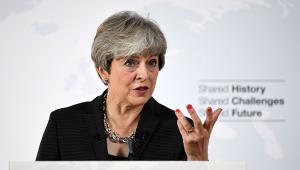A credible narrative can be a powerful means for telling people who they are and where they came from. It can also explain the meaning behind their current situation, and give them hope and direction for the future.
People in positions of leadership know this. They know that people will look to them to define a narrative. In the absence of a credible narrative people will make one up for themselves.
Economic policies in the current parliament are underpinned by two narratives – the austerity one, and the European one. Both are failing, yet have such persistence that there is a real danger that current and future economic policies will be driven down the wrong path.
The austerity narrative runs something like this: ‘During the first decade of the current century the UK public sector grew rapidly during a period of sustained economic growth. It expanded well beyond the country's ability to afford it, and in doing so accumulated a significant amount of debt which was out of all proportion to the country's income. When the recession came in 2007, as a result of international circumstances outside the UK's control, the public sector was forced to increase its indebtedness to bail out the banks, but it also was very slow in responding to the loss of economic growth. Its debts are now unsustainable.
‘The public sector expenditure needs to be cut drastically, stripping out the fat of the growth years, improving efficiency and productivity, to reduce the public sector debt to long-term sustainable levels. Like households, banks, and businesses, the country has to cut its expenditure and debt and do so quickly. To fail to do so will only prolong the agony, and the loss of credit credibility that would follow will diminish confidence in the country, and our ability to attract investment and grow. This will be very painful to achieve, but if everybody does their fair share, then we should be able to return to a more fiscally responsible, but smaller, public sector which is in everybody's best interests, as the economy returns fairly quickly to its long-term growth path.’
The two key elements of this narrative – that the economy returns to its long-term growth path, and the public sector debt returns to more acceptable levels compared to GDP – are increasingly less credible. Conventional theory has it that most recessions are over within 1 to 2 years. Despite press speculation about double or triple dip recessions, the UK economy lost 5% of its GDP in 2007 and has never recovered it. Public sector debt is not declining. Though sometimes clouded with the smokescreen of special factors the long-term position is that the debt is not budging, and is even getting worse. People see continuing austerity biting into public services that they value, and they do not feel that everyone is doing their bit in a fair fashion. And - the final indignity - the prized credit rating, which was seen as a hallmark of fiscal rectitude, has been lost in doubt over long-term growth prospects.
Increasingly mainstream economic commentators and quasi-government bodies like the IMF and OECD are recognising that a change of policy is needed. Finance ministers at the recent G7 Summit also seem to be moderating their enthusiasm for austerity. Japan, which has experienced the impact of a low growth balance sheet recession for over a decade has adopted more overtly Keynesian policy initiatives. But the narrative remains substantially unchanged, and unless and until it is replaced with an alternative that more closely matches recent experience it will be hard to switch to more innovative policies.
The European narrative runs like this:
‘At the end of the Second World War the devastated economies of Europe joined together in an economic union with the intention of promoting their recovery, and also removing the economic rivalry which had led to two devastating world wars. Britain, as one of the victorious Great Powers, with widespread international trading interests was not involved. Later on as the European economies recovered strongly, and as Britain divested itself of its colonial empire, it became more obvious that Britain's strong economic and trading links with Europe meant that, on balance, Britain's interests were best served by joining the European Community.
‘However, since that time the European Union has dramatically expanded the scope of its activities to cover a wide range of social, cultural, and political objectives that go well beyond the UK's economic interests and impinge on its sense of history, culture, and sovereignty. The recent development of the Euro has only served to reinforce the ultimate political objectives of some of the EU's core membership, whilst at the same time it has created an economic crisis that Britain did well to stay out of. The time is now right for Britain to have a further reassessment of the costs and benefits of its EU membership and to decide whether, on balance, it is in Britain's economic interests to remain within the European Community.’
This narrative is failing because its assertions were never true to begin with. The First World War saw the destruction of many European empires and the loss of Britain’s Great Power status. But the isolationism of America, and the internal turmoil of the Soviet Union, meant that the UK was able to delude itself that it retained Great Power status throughout the interwar period, and immediately after the Second World War. The illusion was finally shattered at Suez. Unable to sustain Great Power status we took a subservient role to the United States in foreign policy, and as we could not sustain an empire economically divested ourselves of colonial responsibilities in short order.
Britain rapidly realised that it had to improve its relationships with Europe, its major trading partner. We continue to claim a ‘special relationship’ with the United States, and vacillate between the two. To retain a foot in both camps the UK political establishment invented the fiction that Britain was a part of Europe on a trading basis only, and that this was an ‘on balance’ decision. Consequently Britain has always been a semi-detached part of the European Union, unwilling to acknowledge that from the first this was as much a political as a trading entity. The British public has been fed a diet about independence and sovereignty being diminished by the EU, when in many cases the impact of our international obligations are to do with institutions outside the EU, and independent sovereignty is just a myth.
What are the alternative narratives? Two could replace the failing narratives of austerity and Europe – the equity narrative, and the sustainability narrative.
The equity narrative would run something like this:
‘Along with many Western economies the UK economy took a wrong turn in the 1980s when it adopted the supply-side economics of monetarism. As a result of major deregulation, the generation of private monopolies, the replacement of trading in asset values as opposed to the manufacture of things and the delivery of services, a small minority – the top 1% – has seen huge increases in their income and wealth, while the income and wealth of the vast majority has stagnated or declined. The enormous increase in the disparity of income has created a great deal of community stress and put pressure for increases in public services in education, health, and law and order. Increases in public services were paid for by growth generated by a succession of asset price bubbles, funded by debt.
‘Now that weaknesses in the globalised economy have become apparent, it is time to undo the excesses of the past 30 years and undertake policies which return our society to a more equal basis. The impact on economic activity is likely to be positive, or at least neutral. However it will also result in the long-term reduction in the level of public sector supported interventions as some of the underlying causes of public expenditure are removed. It is a policy which commands people's support because it is in line with their inherent sense of what is fair and just.’
The sustainability narrative runs like this:
‘The impact of many years of sustained economic activity by human beings is now impacting on the environment of the planet and the economic, social, and cultural well-being of future generations. It is not in the interests of this country, or indeed of any countries for us to wait until this becomes an absolute crisis, and a source of conflict and violence. Addressing the demands of a more sustainable and green economy will develop opportunities for new services and products that will help replace the loss of unsustainable services and products that has already occurred. But it will also mean that we look to the future of the most vulnerable in our society – the very old and the new generations – rather than to our own generation's interest.’
The challenge to the political parties would be to abandon the failing narratives in favour of these two approaches. The radical policies that follow would be truly innovative.











